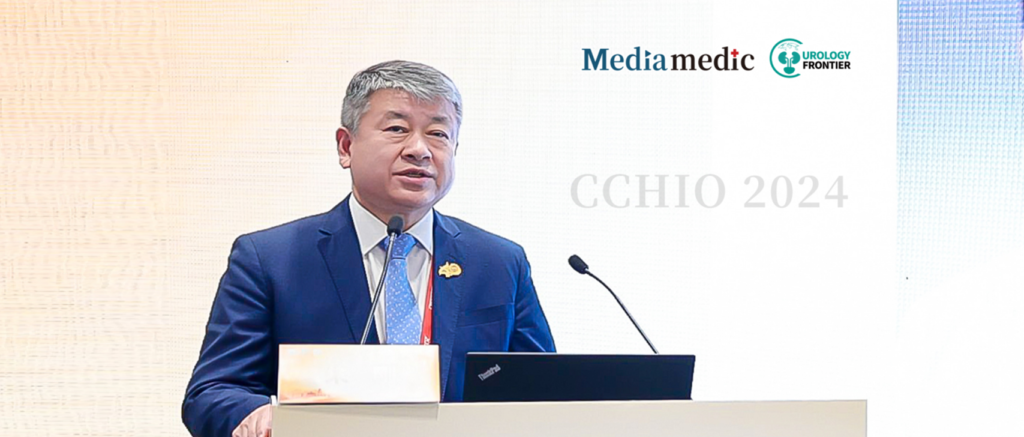
Editor's Note:With economic development, lifestyle changes, and environmental factors, prostate cancer incidence in China has significantly increased. Screening high-risk populations and providing precision treatment and rehabilitation support based on patient characteristics are crucial for improving cure rates and quality of life. At the 2024 Chinese Congress of Holistic Integrative Oncology (CCHIO), Dr. Gang Zhu, Chair of the Urological Oncology Rehabilitation Committee of the Chinese Anti-Cancer Association and Director of General Surgery and Urology at United Family Healthcare, presented insights on individualized treatment for prostate cancer. Urology Frontier had the opportunity to delve deeper into this topic with Professor Zhu.1. Urology Frontier: Precision medicine and individualized treatment are emphasized in prostate cancer management. What is your perspective on the value of genetic testing and liquid biopsies in clinical practice?
Dr. Gang Zhu:Thank you, Urology Frontier, for this interview. As the Director of Urology at United Family Healthcare and Chair of the Urological Oncology Rehabilitation Committee, I am delighted to discuss individualized treatment for prostate cancer.
In oncology, we’ve witnessed significant advancements. Previously, surgical success and tumor removal were considered sufficient. However, with evolving technologies, theories, and equipment, we now aim not only to “cure” the disease but also to preserve physiological functions. For prostate cancer surgeries, maintaining urinary control and erectile function has become a priority.
Genetic testing and liquid biopsies play an increasingly vital role in prostate cancer diagnosis and treatment. For patients with a family history, screening for mutations in genes like BRCA1/2 is particularly important. Studies indicate that BRCA2 mutations are prevalent in hereditary prostate cancer. We strongly recommend BRCA1/2 genetic testing for at-risk individuals to enable early detection and prevention. As for liquid biopsies, while promising, their clinical application requires further validation.
2. Urology Frontier: For patients undergoing radical prostatectomy, how do you develop individualized rehabilitation plans?
Dr. Gang Zhu:Rehabilitation is gaining prominence in oncology. Previously confined to orthopedic recovery, rehabilitation is now integrated across the cancer care continuum, from diagnosis to recovery. It encompasses psychological support, nutritional guidance, sports medicine, and even traditional Chinese medicine.
Prostate cancer patients often face psychological stress and anxiety from diagnosis through recovery. Effective counseling and support are essential. Patients must understand the purpose of surgery, potential complications, and post-operative expectations regarding urinary control and erectile function. This reduces anxiety and fosters trust.
Given physicians’ busy schedules, comprehensive patient education is crucial. We recently launched the Patient Education Handbook for Urological Oncology at CCHIO. Covering nine common urological malignancies, it provides evidence-based guidance and enhanced recovery after surgery (ERAS) principles. This handbook helps patients understand their conditions and work effectively with healthcare providers.
For perioperative rehabilitation, ERAS principles optimize outcomes. For example, modern approaches advocate pre-operative intake of easily digestible food up to six hours before surgery and clear liquids up to two hours prior unless contraindicated. This reduces hunger and physical strain.
In terms of erectile function recovery, low-dose PDE-5 inhibitors have shown efficacy. For urinary incontinence, pelvic floor muscle exercises, such as daily anal contraction exercises (10 repetitions per session, three times a day), can accelerate recovery. Consistent practice significantly improves outcomes.
3. Urology Frontier: What are your recommendations for individualized treatment plans for mHSPC patients in clinical practice?
Dr. Gang Zhu:For metastatic hormone-sensitive prostate cancer (mHSPC), standardized international treatment protocols typically combine androgen deprivation therapy (ADT) with androgen receptor inhibitors. Surgical castration or luteinizing hormone-releasing hormone analogs are common options.
In certain cases, chemotherapy with drugs like docetaxel is also effective, particularly for managing disease progression. However, individual responses vary depending on the extent of metastasis. Seeking advice from urological oncology specialists ensures the most suitable treatment plan.
Prolonged ADT can increase the risk of bone-related complications. Calcium and vitamin D supplementation are simple yet effective preventative measures. A daily multivitamin can significantly reduce pathological fracture risks, ensuring bone health during treatment.
4. Urology Frontier: For mCRPC patients, what strategies can improve symptoms and delay disease progression?
Dr. Gang Zhu:Metastatic castration-resistant prostate cancer (mCRPC) occurs when tumors continue to progress despite achieving castrate testosterone levels (<50 ng/dL). In such cases, continued ADT remains essential alongside additional therapies.
Recent innovations, such as next-generation androgen receptor inhibitors like darolutamide and apalutamide, have shown significant survival benefits. Chemotherapy with docetaxel or cabazitaxel has also demonstrated efficacy in controlling tumor growth and alleviating symptoms.
For patients with bone metastases and severe pain, calcium supplements and bone-protecting agents are routine treatments. Radiopharmaceuticals, such as lutetium-177, have proven effective internationally in reducing pain and slowing disease progression.
At advanced stages, palliative care becomes crucial. Emphasizing dignity and comfort ensures that patients maintain quality of life, even in their final stages. Comprehensive support and symptom management remain integral across all treatment phases.

About Dr. Gang Zhu
- Current Roles: Deputy Medical Director (Beijing Region), General Surgery and Urology Director, United Family Healthcare Chair, Urological Oncology Rehabilitation Committee, Chinese Anti-Cancer Association
- Academic and Clinical Expertise: PhD, King’s College London, University of London, UK Nationally recognized medical expert in China, recipient of the Prostate Cancer Special Contribution Award Extensive contributions to robotic and laparoscopic urological surgeries, with a focus on oncology and prostate diseases
- Key Achievements: Published 107 academic papers (22 SCI-indexed), authored/co-authored 22 books, including 8 in English Editorial roles in international and national guidelines on prostate, bladder, and kidney cancer 34 years of clinical experience, specializing in minimally invasive robotic and laparoscopic surgeries
Professor Zhu’s contributions to urological oncology exemplify the integration of cutting-edge techniques and patient-centered care, offering comprehensive solutions for prostate cancer management.


